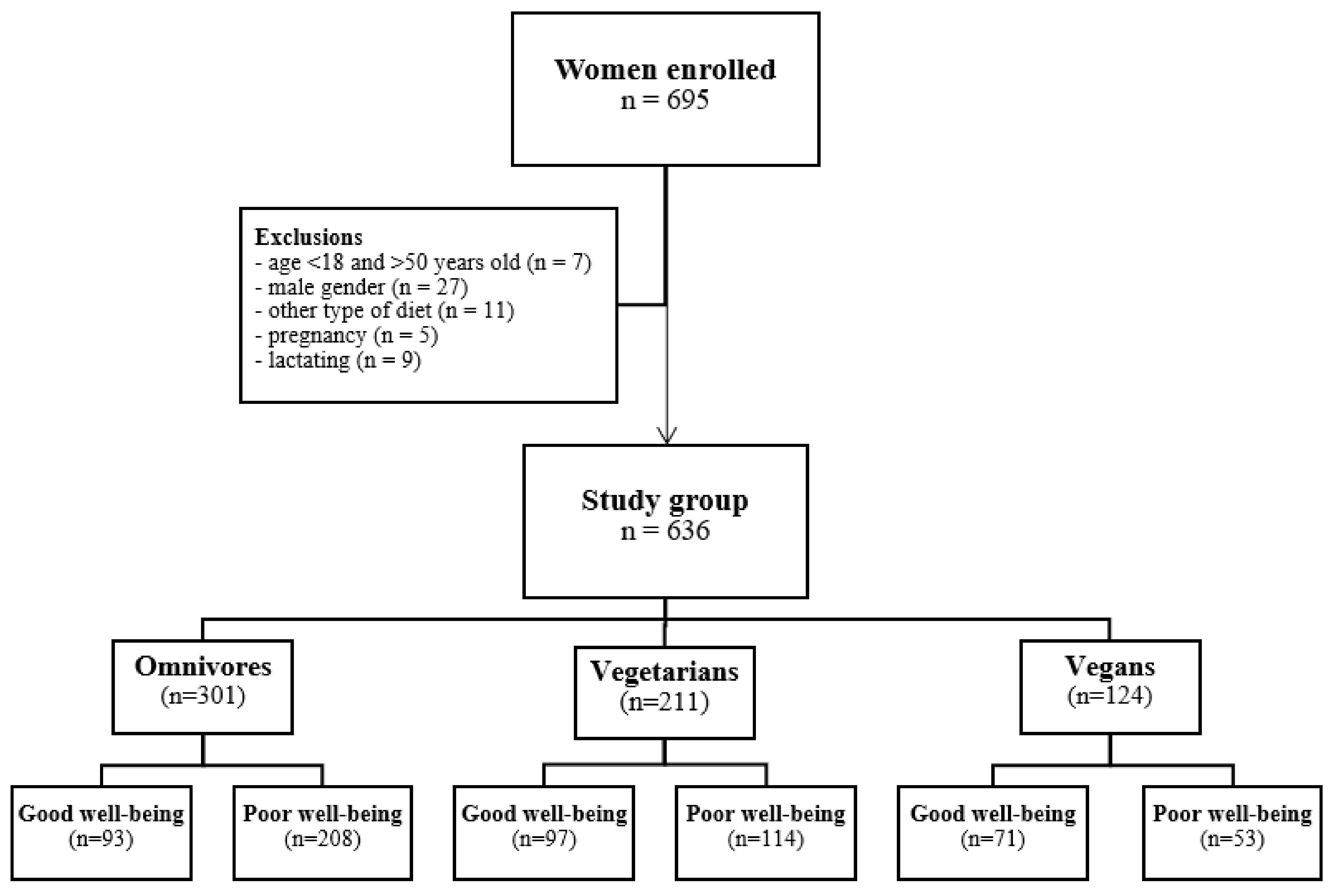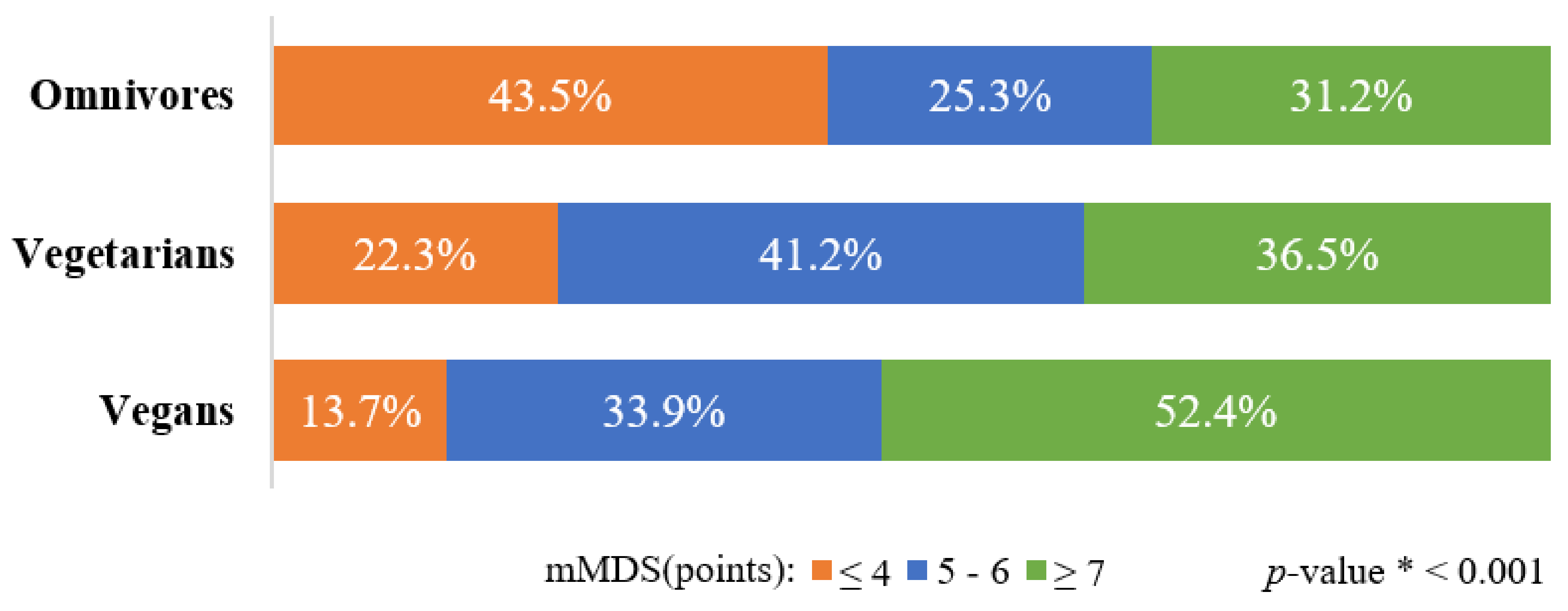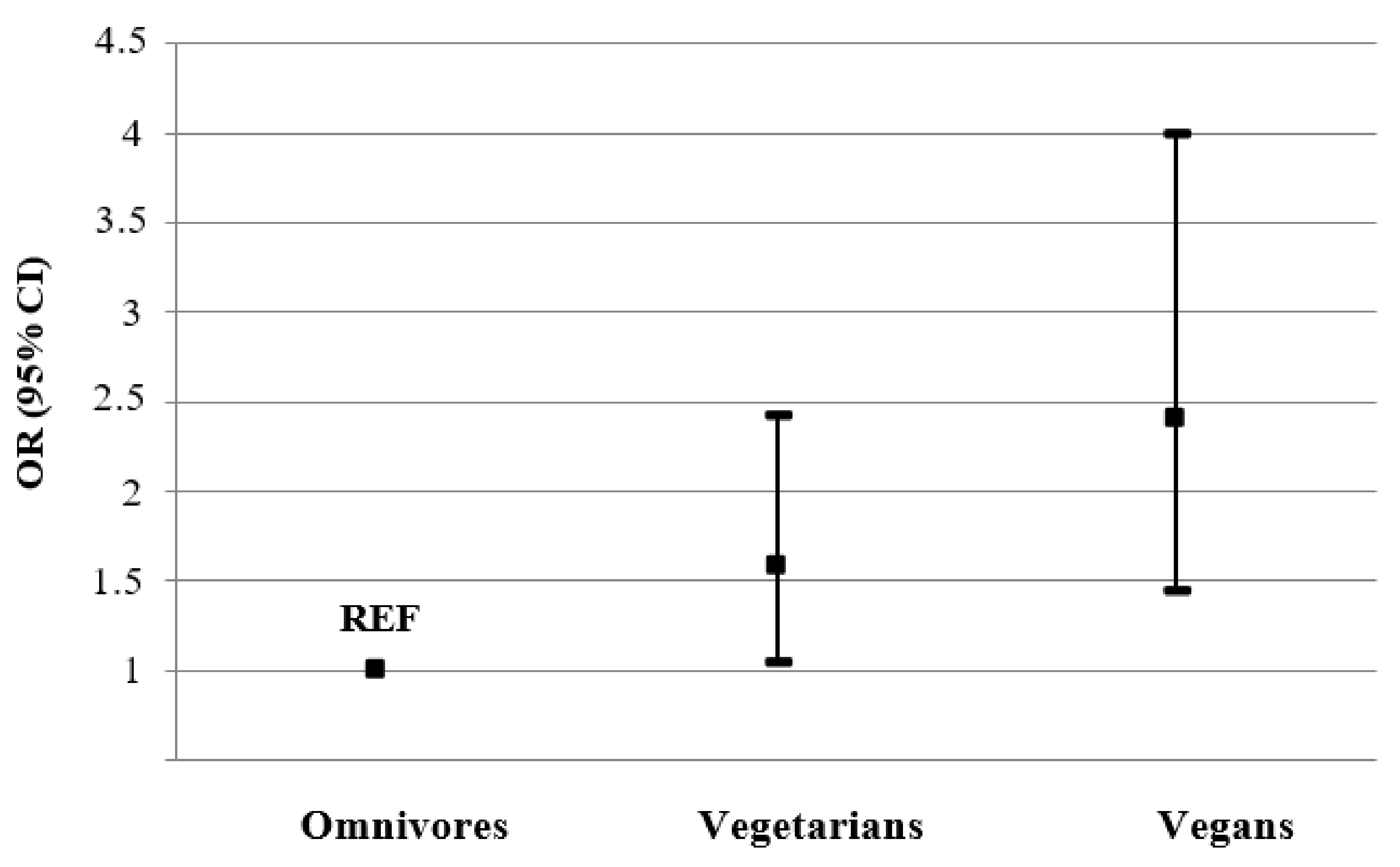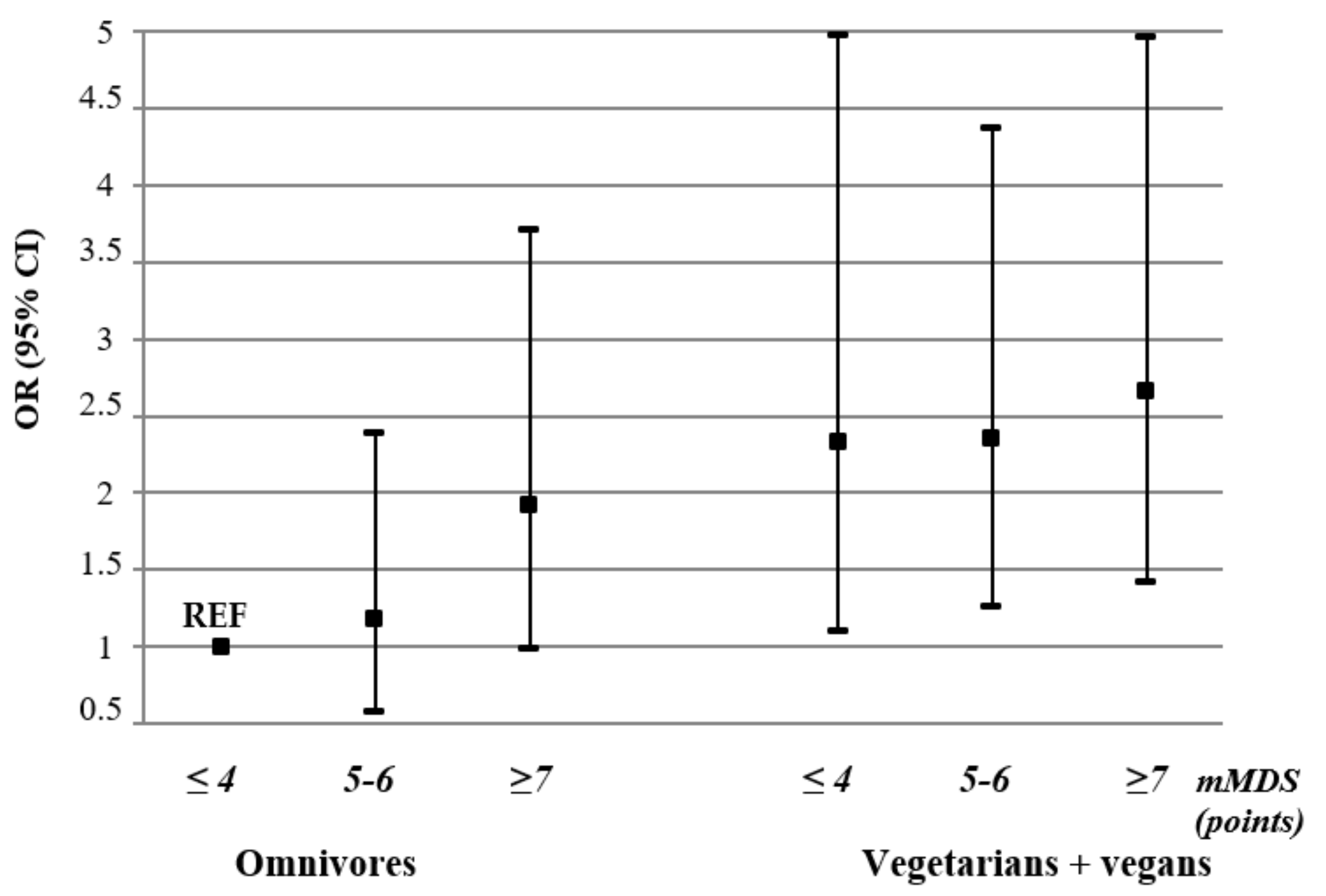Mediterranean-Style Diet and Other Determinants of Well-Being in Omnivorous, Vegetarian, and Vegan Women
Abstract
1. Introduction
2. Materials and Methods
2.1. Study Design
2.2. Study Population and Data Collection
2.3. Assessment of Mediterranean-Style Diet Adherence
2.4. Statistical Analysis
3. Results
3.1. Basic Characteristics and Well-Being
3.2. Mediterranean-Style Diet Adherence
3.3. Mediterranean-Style Diet Adherence versus Well-Being
3.4. Determinants of Women’s Well-Being by Type of Diet Followed
4. Discussion
5. Conclusions
Supplementary Materials
Author Contributions
Funding
Institutional Review Board Statement
Informed Consent Statement
Data Availability Statement
Conflicts of Interest
References
- Institute of Health Metrics and Evaluation. Global Health Data Exchange (GHDx). Available online: https://vizhub.healthdata.org/gbd-results/ (accessed on 12 December 2022).
- World Health Organization. Mental Health and COVID-19: Early Evidence of the Pandemic’s Impact: Scientific Brief, 2 March 2022. Available online: https://www.who.int/publications-detail-redirect/WHO-2019-nCoV-Sci_Brief-Mental_health-2022.1 (accessed on 12 December 2022).
- World Health Organization. Depression. Available online: https://www.who.int/news-room/fact-sheets/detail/depression (accessed on 12 December 2022).
- Lawler, M.; Nixon, E. Body Dissatisfaction among Adolescent Boys and Girls: The Effects of Body Mass, Peer Appearance Culture and Internalization of Appearance Ideals. J. Youth Adolesc. 2011, 40, 59–71. [Google Scholar] [CrossRef] [PubMed]
- Preston, C.; Ehrsson, H.H. Illusory Obesity Triggers Body Dissatisfaction Responses in the Insula and Anterior Cingulate Cortex. Cereb. Cortex 2016, 26, 4450–4460. [Google Scholar] [CrossRef] [PubMed]
- Kuehner, C. Why Is Depression More Common among Women than among Men? Lancet Psychiatry 2017, 4, 146–158. [Google Scholar] [CrossRef] [PubMed]
- Blodgett, J.M.; Mitchell, J.J.; Stamatakis, E.; Chastin, S.; Hamer, M. Associations between the Composition of Daily Time Spent in Physical Activity, Sedentary Behaviour and Sleep and Risk of Depression: Compositional Data Analyses of the 1970 British Cohort Study. J. Affect. Disord. 2023, 320, 616–620. [Google Scholar] [CrossRef]
- Meaklim, H.; Saunders, W.J.; Byrne, M.L.; Junge, M.F.; Varma, P.; Finck, W.A.; Jackson, M.L. Insomnia Is a Key Risk Factor for Persistent Anxiety and Depressive Symptoms: A 12-Month Longitudinal Cohort Study during the COVID-19 Pandemic. J. Affect. Disord. 2023, 322, 52–62. [Google Scholar] [CrossRef]
- Yang, Y.; Liu, X.; Liu, Z.-Z.; Tein, J.-Y.; Jia, C.-X. Life Stress, Insomnia, and Anxiety/Depressive Symptoms in Adolescents: A Three-Wave Longitudinal Study. J. Affect. Disord. 2023, 322, 91–98. [Google Scholar] [CrossRef]
- Lassale, C.; Batty, G.D.; Baghdadli, A.; Jacka, F.; Sánchez-Villegas, A.; Kivimäki, M.; Akbaraly, T. Healthy Dietary Indices and Risk of Depressive Outcomes: A Systematic Review and Meta-Analysis of Observational Studies. Mol. Psychiatry 2019, 24, 965–986. [Google Scholar] [CrossRef]
- Bayes, J.; Schloss, J.; Sibbritt, D. A Randomised Controlled Trial Assessing the Effect of a Mediterranean Diet on the Symptoms of Depression in Young Men (the ‘AMMEND’ Study): A Study Protocol. Br. J. Nutr. 2021, 126, 730–737. [Google Scholar] [CrossRef]
- Berkins, S.; Schiöth, H.B.; Rukh, G. Depression and Vegetarians: Association between Dietary Vitamin B6, B12 and Folate Intake and Global and Subcortical Brain Volumes. Nutrients 2021, 13, 1790. [Google Scholar] [CrossRef]
- Modlinska, K.; Adamczyk, D.; Maison, D.; Pisula, W. Gender Differences in Attitudes to Vegans/Vegetarians and Their Food Preferences, and Their Implications for Promoting Sustainable Dietary Patterns–A Systematic Review. Sustainability 2020, 12, 6292. [Google Scholar] [CrossRef]
- Dinu, M.; Abbate, R.; Gensini, G.F.; Casini, A.; Sofi, F. Vegetarian, Vegan Diets and Multiple Health Outcomes: A Systematic Review with Meta-Analysis of Observational Studies. Crit. Rev. Food Sci. Nutr. 2017, 57, 3640–3649. [Google Scholar] [CrossRef] [PubMed]
- Iguacel, I.; Huybrechts, I.; Moreno, L.A.; Michels, N. Vegetarianism and Veganism Compared with Mental Health and Cognitive Outcomes: A Systematic Review and Meta-Analysis. Nutr. Rev. 2021, 79, 361–381. [Google Scholar] [CrossRef] [PubMed]
- Ocklenburg, S.; Borawski, J. Vegetarian Diet and Depression Scores: A Meta-Analysis. J. Affect. Disord. 2021, 294, 813–815. [Google Scholar] [CrossRef]
- Askari, M.; Daneshzad, E.; Darooghegi Mofrad, M.; Bellissimo, N.; Suitor, K.; Azadbakht, L. Vegetarian Diet and the Risk of Depression, Anxiety, and Stress Symptoms: A Systematic Review and Meta-Analysis of Observational Studies. Crit. Rev. Food Sci. Nutr. 2022, 62, 261–271. [Google Scholar] [CrossRef]
- WHO Consultation on Obesity; World Health Organization. Obesity: Preventing and Managing the Global Epidemic: Report of a WHO Consultation; World Health Organization Technical Report Series; World Health Organization: Geneva, Switzerland, 2000; Volume 894, pp. 1–253. [Google Scholar]
- World Health Organization. Regional Office for Europe Wellbeing Measures in Primary Health Care/the DepCare Project: Report on a WHO Meeting: Stockholm, Sweden, 12–13 February 1998; World Health Organization, Regional Office for Europe: Geneva, Switzerland, 1998. [Google Scholar]
- Topp, C.W.; Østergaard, S.D.; Søndergaard, S.; Bech, P. The WHO-5 Well-Being Index: A Systematic Review of the Literature. Psychother Psychosom 2015, 84, 167–176. [Google Scholar] [CrossRef]
- Jeżewska-Zychowicz, M.; Gawęcki, J.; Wądołowska, L.; Czarnocińska, J.; Galiński, G.; Kołłajtis-Dołowy, A.; Roszkowski, W.; Wawrzyniak, A.; Przybyłowicz, K.; Krusińska, B.; et al. Dietary Habits and Nutrition Beliefs Questionnaire for People, Version 1.1.–Interviewer Administered Questionnaire. Chapter 1. In Dietary Habits and Nutrition Beliefs Questionnaire and the Manual for Developing of Nutritional Data; The Committee of Human Nutrition, Polish Academy of Sciences: Olsztyn, Poland, 2018; pp. 3–20. [Google Scholar]
- Kowalkowska, J.; Wadolowska, L.; Czarnocinska, J.; Czlapka-Matyasik, M.; Galinski, G.; Jezewska-Zychowicz, M.; Bronkowska, M.; Dlugosz, A.; Loboda, D.; Wyka, J. Reproducibility of a Questionnaire for Dietary Habits, Lifestyle and Nutrition Knowledge Assessment (KomPAN) in Polish Adolescents and Adults. Nutrients 2018, 10, 1845. [Google Scholar] [CrossRef]
- Trichopoulou, A.; Bamia, C.; Trichopoulos, D. Anatomy of Health Effects of Mediterranean Diet: Greek EPIC Prospective Cohort Study. BMJ 2009, 338, b2337. [Google Scholar] [CrossRef]
- Beezhold, B.L.; Johnston, C.S.; Daigle, D.R. Vegetarian diets are associated with healthy mood states: A cross-sectional study in Seven Day Adventist adults. Nutr. J. 2010, 9, 26. [Google Scholar] [CrossRef]
- Beezhold, B.; Radnitz, C.; Rinne, A.; DiMatteo, J. Vegans Report Less Stress and Anxiety than Omnivores. Nutr. Neurosci. 2015, 18, 289–296. [Google Scholar] [CrossRef]
- Baines, S.; Powers, J.; Brown, W.J. How Does the Health and Well-Being of Young Australian Vegetarian and Semi-Vegetarian Women Compare with Non-Vegetarians? Public Health Nutr. 2007, 10, 436–442. [Google Scholar] [CrossRef] [PubMed]
- Głąbska, D.; Guzek, D.; Groele, B.; Gutkowska, K. Fruit and Vegetable Intake and Mental Health in Adults: A Systematic Review. Nutrients 2020, 12, 115. [Google Scholar] [CrossRef] [PubMed]
- Conner, T.S.; Brookie, K.L.; Carr, A.C.; Mainvil, L.A.; Vissers, M.C.M. Let Them Eat Fruit! The Effect of Fruit and Vegetable Consumption on Psychological Well-Being in Young Adults: A Randomized Controlled Trial. PLoS ONE 2017, 12, e0171206. [Google Scholar] [CrossRef] [PubMed]
- Martins, L.B.; Braga Tibães, J.R.; Sanches, M.; Jacka, F.; Berk, M.; Teixeira, A.L. Nutrition-Based Interventions for Mood Disorders. Expert Rev. Neurother. 2021, 21, 303–315. [Google Scholar] [CrossRef]
- Clarys, P.; Deliens, T.; Huybrechts, I.; Deriemaeker, P.; Vanaelst, B.; De Keyzer, W.; Hebbelinck, M.; Mullie, P. Comparison of Nutritional Quality of the Vegan, Vegetarian, Semi-Vegetarian, Pesco-Vegetarian and Omnivorous Diet. Nutrients 2014, 6, 1318–1332. [Google Scholar] [CrossRef]
- Nezlek, J.B.; Forestell, C.A.; Newman, D.B. Relationships between Vegetarian Dietary Habits and Daily Well-Being. Ecol. Food Nutr. 2018, 57, 425–438. [Google Scholar] [CrossRef]
- Jetten, J.; Haslam, S.A.; Cruwys, T.; Greenaway, K.H.; Haslam, C.; Steffens, N.K. Advancing the Social Identity Approach to Health and Well-Being: Progressing the Social Cure Research Agenda. Eur. J. Soc. Psychol. 2017, 47, 789–802. [Google Scholar] [CrossRef]
- Bagci, S.C.; Olgun, S. A Social Identity Needs Perspective to Veg*nism: Associations between Perceived Discrimination and Well-Being among Vegans in Turkey. Appetite 2019, 143, 104441. [Google Scholar] [CrossRef]
- Matta, J.; Czernichow, S.; Kesse-Guyot, E.; Hoertel, N.; Limosin, F.; Goldberg, M.; Zins, M.; Lemogne, C. Depressive Symptoms and Vegetarian Diets: Results from the Constances Cohort. Nutrients 2018, 10, 1695. [Google Scholar] [CrossRef]
- Avital, K.; Buch, A.; Hollander, I.; Brickner, T.; Goldbourt, U. Adherence to a Mediterranean Diet by Vegetarians and Vegans as Compared to Omnivores. Int. J. Food Sci. Nutr. 2020, 71, 378–387. [Google Scholar] [CrossRef]
- López-Olivares, M.; Mohatar-Barba, M.; Fernández-Gómez, E.; Enrique-Mirón, C. Mediterranean Diet and the Emotional Well-Being of Students of the Campus of Melilla (University of Granada). Nutrients 2020, 12, 1826. [Google Scholar] [CrossRef] [PubMed]
- Andrade, V.; Jorge, R.; García-Conesa, M.-T.; Philippou, E.; Massaro, M.; Chervenkov, M.; Ivanova, T.; Maksimova, V.; Smilkov, K.; Ackova, D.G.; et al. Mediterranean Diet Adherence and Subjective Well-Being in a Sample of Portuguese Adults. Nutrients 2020, 12, 3837. [Google Scholar] [CrossRef] [PubMed]
- Lo Moro, G.; Corezzi, M.; Bert, F.; Buda, A.; Gualano, M.R.; Siliquini, R. Mental Health and Adherence to Mediterranean Diet among University Students: An Italian Cross-Sectional Study. J. Am. Coll. Health 2021, 1–11. [Google Scholar] [CrossRef] [PubMed]
- Jacka, F.N.; O’Neil, A.; Opie, R.; Itsiopoulos, C.; Cotton, S.; Mohebbi, M.; Castle, D.; Dash, S.; Mihalopoulos, C.; Chatterton, M.L.; et al. A Randomised Controlled Trial of Dietary Improvement for Adults with Major Depression (the ‘SMILES’ Trial). BMC Med. 2017, 15, 23. [Google Scholar] [CrossRef] [PubMed]
- Parletta, N.; Zarnowiecki, D.; Cho, J.; Wilson, A.; Bogomolova, S.; Villani, A.; Itsiopoulos, C.; Niyonsenga, T.; Blunden, S.; Meyer, B.; et al. A Mediterranean-Style Dietary Intervention Supplemented with Fish Oil Improves Diet Quality and Mental Health in People with Depression: A Randomized Controlled Trial (HELFIMED). Nutr Neurosci 2019, 22, 474–487. [Google Scholar] [CrossRef]
- Ventriglio, A.; Sancassiani, F.; Contu, M.P.; Latorre, M.; Di Slavatore, M.; Fornaro, M.; Bhugra, D. Mediterranean Diet and Its Benefits on Health and Mental Health: A Literature Review. Clin. Pract. Epidemiol. Ment. Health 2020, 16, 156–164. [Google Scholar] [CrossRef]
- Gantenbein, K.V.; Kanaka-Gantenbein, C. Mediterranean Diet as an Antioxidant: The Impact on Metabolic Health and Overall Wellbeing. Nutrients 2021, 13, 1951. [Google Scholar] [CrossRef]
- Men and Depression. Available online: https://www.nimh.nih.gov/health/publications/men-and-depression (accessed on 25 December 2022).
- Neufingerl, N.; Eilander, A. Nutrient Intake and Status in Adults Consuming Plant-Based Diets Compared to Meat-Eaters: A Systematic Review. Nutrients 2021, 14, 29. [Google Scholar] [CrossRef]
- Anglin, R.E.S.; Samaan, Z.; Walter, S.D.; McDonald, S.D. Vitamin D Deficiency and Depression in Adults: Systematic Review and Meta-Analysis. Br. J. Psychiatry 2013, 202, 100–107. [Google Scholar] [CrossRef]





| Parameters | Omnivores (n = 301) | Vegetarians (n = 211) | Vegans (n = 124) | p-Value * |
|---|---|---|---|---|
| Age (years) | 23.0 ± 4.6 a | 24.5 ± 5.9 b | 25.2 ± 7.2 ab | 0.09 |
| Place of residence, % | <0.001 | |||
| Urban | 73.8 | 87.2 | 91.4 | |
| Rural | 26.3 | 12.8 | 8.1 | |
| Educational level, % | 0.07 | |||
| Primary or high school | 56.2 | 47.9 | 59.7 | |
| University | 43.9 | 52.1 | 40.3 | |
| Marital status, % | 0.93 | |||
| Married/partner | 48.8 | 49.8 | 50.8 | |
| Single/widow | 51.2 | 50.2 | 49.2 | |
| Physical activity (hours/week), % | ||||
| <3 | 75.1 | 64.9 | 53.2 | <0.001 |
| ≥3 | 24.9 | 35.1 | 46.8 | |
| Body Mass Index (kg/m2), % | ||||
| <18.5 | 10.0 | 10.0 | 10.5 | 0.64 |
| 18.5–24.9 | 72.4 | 76.3 | 76.6 | |
| ≥25 | 17.9 | 13.8 | 12.9 | |
| Health status (self-reported), % | ||||
| Average or poor | 12.9 | 18.0 | 28.2 | <0.001 |
| At least good | 87.1 | 82.0 | 71.8 | |
| Cigarette smoking, % | ||||
| No | 76.7 | 68.3 | 76.7 | 0.07 |
| Yes | 23.2 | 31.8 | 23.3 | |
| Sleeping time (hours/day), % | ||||
| ≤6 | 27.6 | 26.5 | 23.4 | 0.67 |
| 7–8 | 63.8 | 64.9 | 71.0 | |
| ≥9 | 8.6 | 8.5 | 5.7 | |
| Experience of a traumatic event, % | ||||
| No | 67.7 | 67.8 | 48.5 | <0.001 |
| Yes | 32.3 | 32.2 | 51.5 | |
| Stress level (VAS, points), % | ||||
| ≤4 | 14.0 | 17.1 | 21.8 | 0.38 |
| 5–7 | 45.2 | 45.5 | 41.9 | |
| 8–10 | 40.9 | 37.4 | 36.3 | |
| WHO-5 Index (points) | 10.2 ± 4.2 a | 11.9 ± 4.7 b | 13.3 ± 5.1 c | <0.001 |
| Parameters | Omnivores (n = 301) | Vegetarians (n = 211) | Vegans (n = 124) |
|---|---|---|---|
| Modified Mediterranean Diet Score (mMDS), points | 5.1 ± 2.3 a | 5.6 ± 1.7 b | 6.3 ± 1.3 c |
| Components of mMDS, servings/day | |||
| Vegetables | 1.5 ± 1.1 a | 2.3 ± 1.1 b | 2.6 ± 1.0 c |
| Legumes | 0.1 ± 0.2 a | 0.7 ± 0.7 b | 1.2 ± 0.8 c |
| Fruit | 1.1 ± 0.9 a | 1.4 ± 1.0 b | 1.8 ± 1.1 c |
| Nuts and seeds | 0.3 ± 0.5 a | 0.6 ± 0.6 b | 0.9 ± 0.8 c |
| Wholegrains | 1.0 ± 0.9 a | 1.5 ± 1.0 b | 1.7 ± 1.0 b |
| Fish | 0.1 ± 0.2 | - | - |
| Dairy or dairy substitutes | 0.9 ± 0.9 a | 1.1 ± 1.0 b | 1.0 ±0.9 a |
| Meat or meat substitutes | 0.9 ± 0.7 a | 0.3 ± 0.5 b | 0.4 ± 0.5 c |
| Vitamin D supplements (% of users) | 63.1 a | 73.0 b | 92.0 c |
| Ethanol intake † | 1.0 ± 1.8 a | 3.5 ± 13.7 b | 3.1 ± 12.8 b |
| Parameters | Omnivores | Vegetarians | Vegans | |||
|---|---|---|---|---|---|---|
| Good Well-Being (n = 93) | Poor Well-Being (n = 208) | Good Well-Being (n = 97) | Poor Well-Being (n = 114) | Good Well-Being (n = 71) | Poor Well-Being (n = 53) | |
| Modified Mediterranean Diet Score (mMDS), points | 5.7 ± 2.5 a | 4.8 ± 2.2 b | 5.8 ± 1.6 | 5.5 ± 1.8 | 6.0 ± 1.3 | 6.2 ± 1.4 |
| Components of mMDS, servings/day | ||||||
| Vegetables | 1.8 ± 1.1 a | 1.4 ± 1.1 b | 2.4 ± 1.1 | 2.1 ± 1.1 | 2.6 ± 1.0 | 2.5 ± 1.1 |
| Legumes | 0.2 ± 0.3 a | 0.1 ± 0.2 b | 0.9 ± 0.8 a | 0.6 ± 0.6 b | 1.2 ± 0.8 | 1.1 ± 0.8 |
| Fruit | 1.3 ± 1.0 a | 1.0 ± 0.9 b | 1.4 ± 1.0 | 1.4 ± 0.9 | 1.9 ± 1.0 a | 1.6 ± 1.0 b |
| Nuts and seeds | 0.4 ± 0.5 a | 0.3 ± 0.5 b | 0.6 ± 0.7 | 0.5 ± 0.5 | 1.0 ± 0.8 a | 0.7 ± 0.6 b |
| Wholegrains | 1.0 ± 1.0 | 0.9 ± 0.9 | 1.8 ± 1.0 a | 1.3 ± 0.9 b | 1.7 ± 1.0 | 1.6 ± 0.9 |
| Fish | 0.2 ± 0.2 a | 0.1 ± 0.2 b | - | - | - | - |
| Dairy or dairy substitutes | 0.9 ± 0.8 | 1.0 ± 1.0 | 1.3 ± 1.2 | 1.0 ± 0.9 | 1.0 ± 0.9 | 1.0 ± 0.9 |
| Meat or meat substitutes | 0.9 ± 0.8 | 0.8 ± 0.7 | 0.3 ± 0.5 a | 0.2 ± 0.4 b | 0.3 ± 0.4 | 0.4 ± 0.7 |
| Vitamin D supplements (% of users) | 49.5 | 39.9 | 53.6 | 45.6 | 63.4 | 60.4 |
| Ethanol intake † | 0.7 ± 1.0 | 1.0 ± 2.1 | 2.7 ± 10.3 | 4.2 ± 16.1 | 1.5 ± 2.6 | 5.3 ± 19.2 |
| Study Factors | Omnivores (n = 301) | Vegetarians and Vegans (n = 335) | ||
|---|---|---|---|---|
| Age-Adjusted OR (95% CI) | Multivariate-Adjusted OR (95% CI) | Age-Adjusted OR (95% CI) | Multivariate-Adjusted OR (95% CI) | |
| Age (years) | 1.02 (0.97–1.08) | 1.00 (0.93–1.08) | 1.08 (1.04–1.12) | 1.07 (1.01–1.12) |
| P for trend | 0.390 | 0.997 | <0.001 | 0.013 |
| Place of residence | ||||
| Urban | 1.00 | 1.00 | 1.00 | 1.00 |
| Rural | 1.17 (0.67–2.03) | 1.52 (0.80–2.89) | 1.78 (0.85–3.72) | 1.52 (0.65–3.57) |
| Education level | ||||
| Primary/high school | 1.00 | 1.00 | 1.00 | 1.00 |
| University | 1.46 (0.83–2.55) | 1.43 (0.76–2.71) | 1.07 (0.64–1.78) | 0.92 (0.50–1.66) |
| Marital status | ||||
| Married/partner | 1.00 | 1.00 | 1.00 | 1.00 |
| Single/widow | 0.78 (0.47–1.30) | 0.77 (0.43–1.39) | 1.32 (0.82–2.10) | 1.40 (0.82–2.39) |
| Physical activity (hours/week) | ||||
| <3 | 1.00 | 1.00 | 1.00 | 1.00 |
| ≥3 | 1.56 (0.90–2.71) | 1.20 (0.63–2.29) | 1.88 (1.19–2.97) | 1.81 (1.07–3.05) |
| Body mass index (kg/m2) | ||||
| <18.5 | 1.10 (0.49–2.48) | 1.43 (0.59–3.49) | 0.43 (0.20–0.96) | 0.54 (0.22–1.31) |
| 18.5–24.9 | 1.00 | 1.00 | 1.00 | 1.00 |
| ≥25 | 0.71 (0.36–1.41) | 0.96 (0.44–2.10) | 0.81 (0.42–1.55) | 1.03 (0.50–2.13) |
| P for trend | 0.493 | 0.735 | 0.524 | 0.172 |
| Health status (self-reported) | ||||
| Average or poor | 1.00 | 1.00 | 1.00 | 1.00 |
| At least good | 3.71 (1.89–7.27) | 3.11 (1.49–6.49) | 6.63 (2.99–14.7) | 4.33 (1.86–10.1) |
| Cigarette smoking | ||||
| No | 1.00 | 1.00 | 1.00 | 1.00 |
| Yes | 1.36 (0.77–2.39) | 1.50 (0.77–2.90) | 0.64 (0.39–1.05) | 0.83 (0.47–1.46) |
| Sleeping time (hours/day) | ||||
| ≤6 | 0.52 (0.28–0.94) | 0.76 (0.39–1.53) | 0.40 (0.23–0.68) | 0.53 (0.29–0.95) |
| 7–8 | 1.00 | 1.00 | 1.00 | 1.00 |
| ≥9 | 0.56 (0.21–1.46) | 0.50 (0.18–1.44) | 0.51 (0.21–1.21) | 0.80 (0.30–2.15) |
| Experience of a traumatic event | ||||
| No | 1.00 | 1.00 | 1.00 | 1.00 |
| Yes | 0.70 (0.43–1.15) | 0.89 (0.50–1.57) | 0.61 (0.38–0.99) | 0.96 (0.55–1.68) |
| Stress level (VAS, points) | ||||
| ≤4 | 1.00 | 1.00 | 1.00 | 1.00 |
| 5–7 | 0.42 (0.21–0.86) | 0.36 (0.17–0.79) | 0.45 (0.23–0.89) | 0.55 (0.26–1.13) |
| 8–10 | 0.14 (0.07–0.31) | 0.15 (0.06–0.36) | 0.15 (0.07–0.30) | 0.20 (0.09–0.44) |
| P for trend | <0.001 | <0.001 | <0.001 | <0.001 |
| mMDS (points) | ||||
| ≤4 | 1.00 | 1.00 | 1.00 | 1.00 |
| 5–6 | 1.60 (0.84–3.03) | 1.34 (0.65–2.78) | 1.02 (0.55–1.90) | 1.03 (0.50–2.11) |
| ≥7 | 2.56 (1.43–4.61) | 2.33 (1.17–4.64) | 1.46 (0.79–2.69) | 1.14 (0.56–2.32) |
| P for trend | 0.002 | 0.016 | 0.144 | 0.625 |
Disclaimer/Publisher’s Note: The statements, opinions and data contained in all publications are solely those of the individual author(s) and contributor(s) and not of MDPI and/or the editor(s). MDPI and/or the editor(s) disclaim responsibility for any injury to people or property resulting from any ideas, methods, instructions or products referred to in the content. |
© 2023 by the authors. Licensee MDPI, Basel, Switzerland. This article is an open access article distributed under the terms and conditions of the Creative Commons Attribution (CC BY) license (https://creativecommons.org/licenses/by/4.0/).
Share and Cite
Kaluza, J.; Lozynska, K.; Rudzinska, J.; Granda, D.; Sicinska, E.; Szmidt, M.K. Mediterranean-Style Diet and Other Determinants of Well-Being in Omnivorous, Vegetarian, and Vegan Women. Nutrients 2023, 15, 725. https://doi.org/10.3390/nu15030725
Kaluza J, Lozynska K, Rudzinska J, Granda D, Sicinska E, Szmidt MK. Mediterranean-Style Diet and Other Determinants of Well-Being in Omnivorous, Vegetarian, and Vegan Women. Nutrients. 2023; 15(3):725. https://doi.org/10.3390/nu15030725
Chicago/Turabian StyleKaluza, Joanna, Katarzyna Lozynska, Julia Rudzinska, Dominika Granda, Ewa Sicinska, and Maria Karolina Szmidt. 2023. "Mediterranean-Style Diet and Other Determinants of Well-Being in Omnivorous, Vegetarian, and Vegan Women" Nutrients 15, no. 3: 725. https://doi.org/10.3390/nu15030725
APA StyleKaluza, J., Lozynska, K., Rudzinska, J., Granda, D., Sicinska, E., & Szmidt, M. K. (2023). Mediterranean-Style Diet and Other Determinants of Well-Being in Omnivorous, Vegetarian, and Vegan Women. Nutrients, 15(3), 725. https://doi.org/10.3390/nu15030725









